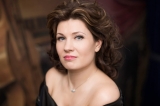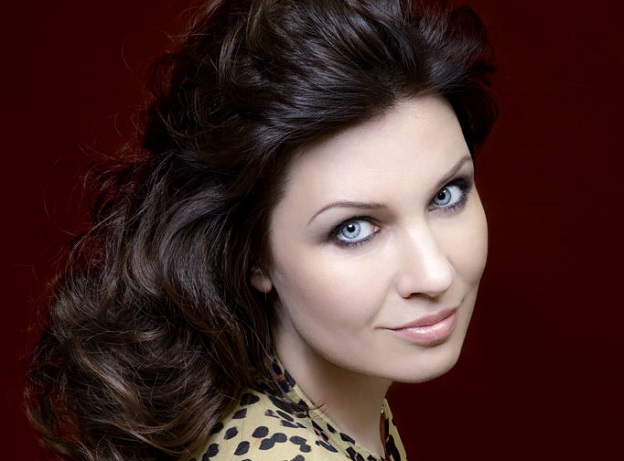Your repertoire is mainly Italian, though you sang already several French roles. Why did you decide to dedicate one entire CD to this repertoire?
I always loved singing the French repertoire. The text has such a big importance, and the instrumental colors in the orchestra portray the inner emotional world of the singer, which you deliver in words. This incredibly colorful palette of sounds in an orchestra requires a rich arsenal in the human voice. It is a good challenge for me. Also, the French language with all its nasal sounds adds a specific charm to it.
You call your CD Elle. Can you explain the choice of this title, please?
 I wanted to show the many different – and sometimes opposite – female characters and their different ways of being. My vision is that many women during their lifetimes change an incredible lot: first, a woman is a girl, a daughter; then she becomes a woman, a wife; and eventually, a mother. Her look changes, her character changes, her worldview changes. She can be passionate and free like Carmen, devoted and loving like Juliette, heartbroken and crazy like Marguerite ultimately becomes, or seductive and irresistible like Thaïs. A specific type of woman was many times the reason behind creating an opera: let’s think of Massenet’s Manon and Esclarmonde, Gounod’s Faust (Marguerite) and Juliette, and many others. So I thought I’d just call this album She, in French, Elle.
I wanted to show the many different – and sometimes opposite – female characters and their different ways of being. My vision is that many women during their lifetimes change an incredible lot: first, a woman is a girl, a daughter; then she becomes a woman, a wife; and eventually, a mother. Her look changes, her character changes, her worldview changes. She can be passionate and free like Carmen, devoted and loving like Juliette, heartbroken and crazy like Marguerite ultimately becomes, or seductive and irresistible like Thaïs. A specific type of woman was many times the reason behind creating an opera: let’s think of Massenet’s Manon and Esclarmonde, Gounod’s Faust (Marguerite) and Juliette, and many others. So I thought I’d just call this album She, in French, Elle.
Does the French language challenge you in a different way than let’s say the Italian language?
Absolutely! One has to figure out exactly where to create the nasal vowels when singing this repertoire, which timbre the orchestra is portraying about your inner world, the emotional state of your soul. It is an exciting journey.
Do you like the roles on this CD, would you like to sing them on stage in a whole production?
I have sung already Marguerite (Faust), Thaïs, Juliette (Roméo et Juliette), and surely would love to do Charpentier’s Louise, Massenet’s Manon, and, if I ever get it offered, I would not refuse singing Bizet’s Carmen.
How difficult is it to really embody a character when you sing only an excerpt from an opera?
Not difficult if you know the whole opera, if you understand every word and fully immerse yourself in the character.
You publish this CD, as the previous ones, on your own label Prima Classic. What was the reason for choosing this path?
There were several reasons. First, I wanted to be free in my artistic decisions – meaning what, when, and with whom should I record. As you know, the human voice changes quite drastically with time and we have to follow its development very wisely, without rushing into the dramatic repertoire or staying too long in the light repertoire. I believe that each singer knows what is best for her or his voice at each particular moment in their careers, and are usually passionate about certain music that reflects their vision of today. Taken this into consideration, I believe that albums should follow the development of the voice and not the other way around.
Another reason is that my voice is one of those so-called « not easy to record » type. Here we should explain such a thing as the operatic voice and its specifics. Our voice is developing in the distance, it grows in the hall and the hall becomes its resonator. When you make a recording, the microphone is right there in front of you, which means the voice will sound different no matter how good or bad the microphone is. Some voices, mainly ‘big’ voices, have a so-called ‘squillo’ which is a sound quality, like a bell in the very high frequencies that allows the voice to cut through the orchestra and to fill the hall effortlessly. This ‘squillo’ in a recording environment very often changes the singer’s timbre. So this is why we need a good sound engineer – in my case, it is my husband -who will make sure that the recorded voice sounds just like as it sounds live. You need much knowledge and creativity to do it as each singer’s voice is unique.
I believe that if you record an album you should leave the best proof of what you were capable of doing at that particular time, and at the best possible level. To do so, the album has to be a piece of art and not a business object. Oftentimes, to get the right sound you need a lot of time, something which big studios do not have because their business model only allows a limited amount of time for sound engineers to work on any given project. We take care of each aspect of our project starting with choosing the repertoire, the name of the album, selecting the cast, working on edits and musical material, and finishing with the artwork design and booklet text. We want each album to be a unique portrait of an artist at a specific time in her or his career.

























